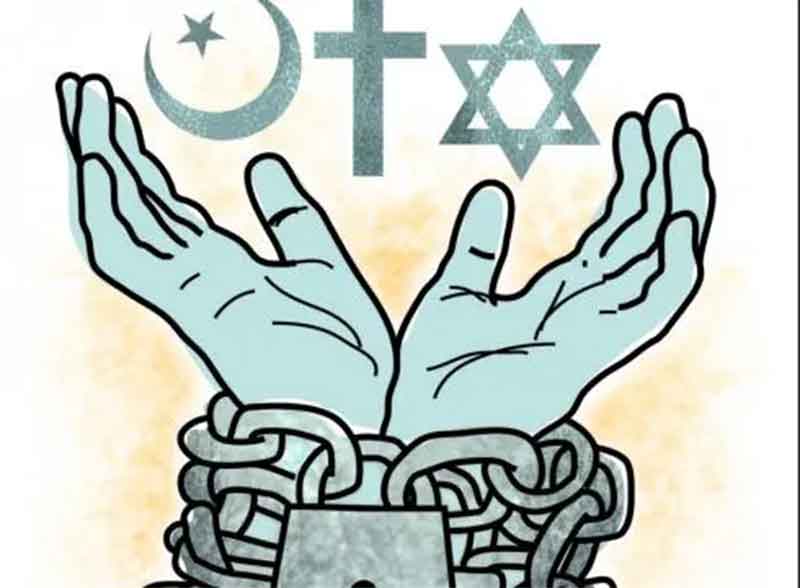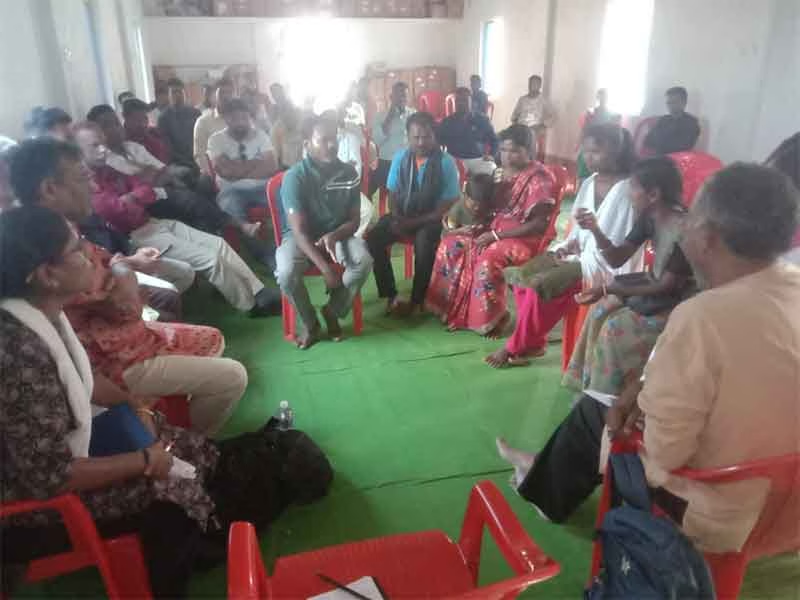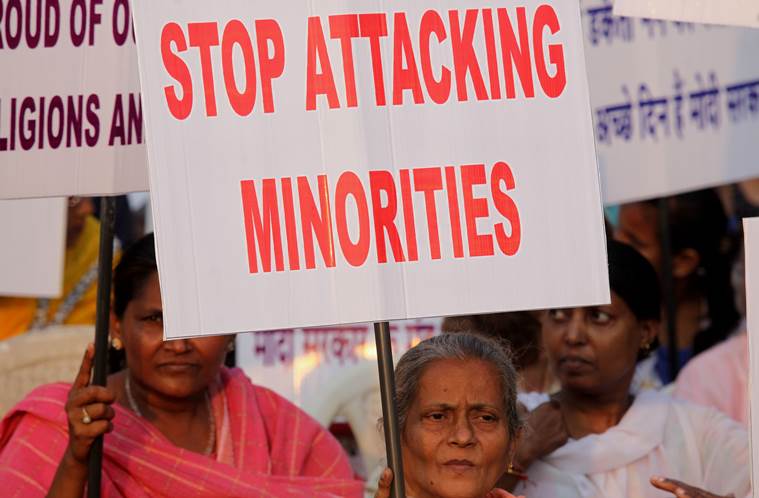
According to United States Commission International Religious Freedom (USCIRF) Report, in 2024, religious freedom conditions in India had continued to deteriorate as the attacks and discrimination against religious minorities continued to rise (Scheneck, 2025).
In India crackdown on freedom of religion is not new. Following the protests in wake of passing Citizenship Amendment Act 2020 there was violence (Vox, 2020). The riots in Delhi were preceded by hate speech and misinformation against minority communities.
The governments political agenda is to promote right-wing Hindu extremism. Violence is being used to restrict freedom of religion. The regime has passed repressive laws like CAA, Anti-Conversion laws, Anti-Cow slaughter laws that undermine secular values.
This brief report analyses violations of freedom of religion in 2024-2025 that happened in India, and were reported online on news websites. It aims to analyze nature of these attacks, narratives and reasons for violence and who were responsible for undermining freedom of religion.
For the purpose of analyzing Freedom of Religion (FORB) violations, it is important to understand the constitutional right of freedom of religion. The Article 25, Right to Freedom of Religion is guaranteed to all persons (including non-citizens). The Article 25 provides freedom of conscience, and the freedom of religion which includes three dimensions, to profess, practice, and propagate religion. The Preamble gives the liberty of thought, expression, belief, faith and worship. The freedom of religion would be meaningless without the right to convert. The freedom of religion is subjected to reasonable restrictions namely public order, morality, and health.
The Freedom of Religion is present in the International Human Rights under Article 18, this right includes the freedom to change his/her religion or belief and the freedom, either alone or in community with others and in public or private, to manifest his religion or belief in teaching, practice, worship and observance. According to ICCPR, “Everyone shall have the right to freedom of thought, conscience and religion. This right shall include freedom to have or to adopt a religion or belief of his choice and also, no one shall be subject to coercion which would impair his freedom to have or to adopt a religion or belief of his choice.” This safeguards people from violation of freedom of religion or undermining FORB by State and non-State actors.
Chattisgarh
In Bastar district, in Chattisgarh State, amid local pressure for “ghar wapsi” (conversion), the Christian groups were threatened by a mob that allegedly stopped a funeral and assaulted seven members of the community in November 2024 (Goyal, 2024).
Six Christian villagers were attacked while standing outside a grocery store when a mob of 200 people allegedly attacked them in November. According to Raju Kashyap, a 40-year-old among those were allegedly assaulted said they were assaulted by the mob and attacked without asking them any questions. “They kicked us, slapped us, and hit us with lathis by the mob.” He said that they were told to leave Christianity or they would lose their lives. According to another villager, the mob also beat everyone standing outside his shop saying to them to do ghar wapsi or be killed by them. The early community celebration of Christmas of the tribals was threatened by the villagers due to these incidents (Goyal, 2024).
According to the Sarpanch of the village, denying land dispute in the first incident, told the media that villagers want these families to return to the “tribal and Hindu fold” and that they are “planning to expel them from the village if they do not do ghar wapsi”. “All villagers have also decided that we will not let them celebrate Christmas this year.”
“An FIR was never lodged by police and complaint given by seven villagers was reworded by the police to link the assault to ‘land dispute’ instead of ‘religious hatred’ and the police also said that FIR would be registered after they investigate the matter,” according to Christians of the village.
The tehsildar of the village served all 23 Christian families a show cause notice that was referring to their homes being constructed on tribal lands and the matter is before executive magistrate’s court. This came after the complaint was given by the seven members.
On January 2, 2025, 25-year-old Kunika Kashyap, was in Bade Bodal village in Bastar, Chhattisgarh, praying for a sick relative when she was assaulted by village headman Ganga Ram Kashyap, his wife and their adult daughter for professing her Christian faith. The six-month pregnant tribal woman in Chhattisgarh suffered a miscarriage after being attacked over her Christian faith (Bakshs, 2025).
The Sarpanch of the village, Tehsildar and villagers’ actions are mounting pressure on those Christians groups in the first incident. In the second incident, village headman, wife and adult daughter are perpetrators. State is playing a partisan role in addressing the law and order. Police are denying the freedom of religion is violated and according to tribals they wanted to lodge an FIR which was never lodged. It appears as if the State and non-state actors collaborated in belief that it was alright for conversion to Hinduism from Christianity even with force whereas tribal would not have the freedom to convert even if it was so voluntarily.
Karnataka
In another incident on religious intolerance in Karnataka’s Bijapur, Uppaladinni area, it was reported on 25th January 2024 that a Christian couple, the woman is an ASHA health-care worker and her husband were beaten up by a group of men and warned of further violence if they continued to practice their faith.
The victims approached the court to lodge a complaint. Police registered a first information report (FIR), based on the court’s order, under Sections 143, 147, 509, 323, 504, 506, and 149 of the Indian Penal Code (IPC).
The group of men actions were of harassment and this included abusive comments hurled at the woman, threats to “ruin” life and her family’s, and warned her of getting her food security card, Aadhar Card, and other government documents cancelled. The men also threatened to get the woman fired from her job.
According to the report, the couple were attacked a day after they were accused locally of “forced conversion” and a campaign was run against them on social media platforms locally and across Karnataka (Ali, 2024).
According to another report on the same incident, the FIR against her at Basavan Bagewadi police station on January 13 accused her of attempting to convert through allurements a pregnant woman whom she visited once a week. The village residents then filed a complaint with the local health authorities who removed her from work on May 30. The woman filed a petition in the Karnataka High Court regarding her termination, and on August 2, the HC issued an order directing her reinstatement. Even after that, tanda residents have objected the woman to discharge her duties and continue to harass her now and then. The woman had appealed in the Karnataka High Court regarding her termination, and on August 2, the HC issued an order directing her reinstatement. Even after that, tanda residents (villagers) have objected to her discharging her duties and continue to harass her now and then (Sheth, 2024).
On January 3, the community chief directed local utility services to cut off electricity and water supply for three Christian families from same place, publicly warning them that they would be killed if they had continued to follow Jesus Christ (Sheth, 2024).
The villagers and the locals, chief of the community are responsible for violent actions targeting freedom to profess and propagate religion. The state is complicit when proper state action is not taken against perpetrators like this case.
A Systemic Coercion
In broader context, taking the example of Chattisgarh, earlier in 2022, on December 18, 1,000 minority Adivasis following the Christian faith in Narayanpur district had gathered in the collectorate, they were facing displacement from their villages and many are being forced to ‘come back’ (Sharma, 2023).
‘Conversion’ is actually religious in its basic nature and should not have political motives. Coercive conversions termed as ‘gharwapsi’ impaired the freedom to choose. In the current incidents freedom of religion are being impaired by the violence and coercion that has political not religious aims and is ‘systemic’.
Structural violence
Though the target is one religion, ‘non-state’ actors perpetrate violence on women, scheduled caste, tribal groups.
Under the ruling political dispensation, there is an attempt to create an authoritarian state through laws affecting the constitutional freedom of religion guaranteed in Article 25 of the Constitution. Law enforcements like anti-conversion law have also been harmful to freely practice religion.
Subscribe to Our Newsletter
Get the latest CounterCurrents updates delivered straight to your inbox.
In the above incidents of violations, one religion is being allowed to dominate through violence. In the current form of violation, State is abetting in committing violence, and by not taking action when the freedom of religion is violated. And, State is partisan in structural violence against the freedom to choose religion.
Rachel I Dsilva is a Research Assistant at the Centre for Study of Society and Secularism. She also works for the global movement of freedom of religion.
Works Cited
Ali, Y. (2024). In Karnataka’s Bijapur, Christian Couple Allegedly Beaten Up for Practising Faith. The Wire.
Bakshs, Z. (2025). Tensions simmer in Bastar between Christians & Right-wing outfits as conversion takes centre stage. The Wire.
Goyal, P. (2024). Assault, local pressure, police inaction’: In a village in Chhattisgarh, uncertainty over Christmas. Newslaundry.
Scheneck, S. (2025). United States Commission on International Religious Freedom Annual Report. US Commission.
Sharma, A. (2023). Escalating attacks against Christian Adivasis in Chhattisgarh. Frontline Magazine.
Sheth, A. (2024). Criminalising faith: Karnataka’s anti-conversion law is being used to harass citizens. The News Minute.
Vox. (2020). Delhi’s deadly riots, explained by an expert.















































